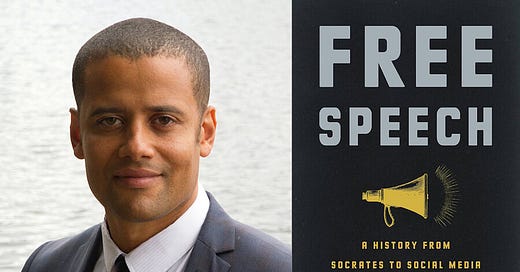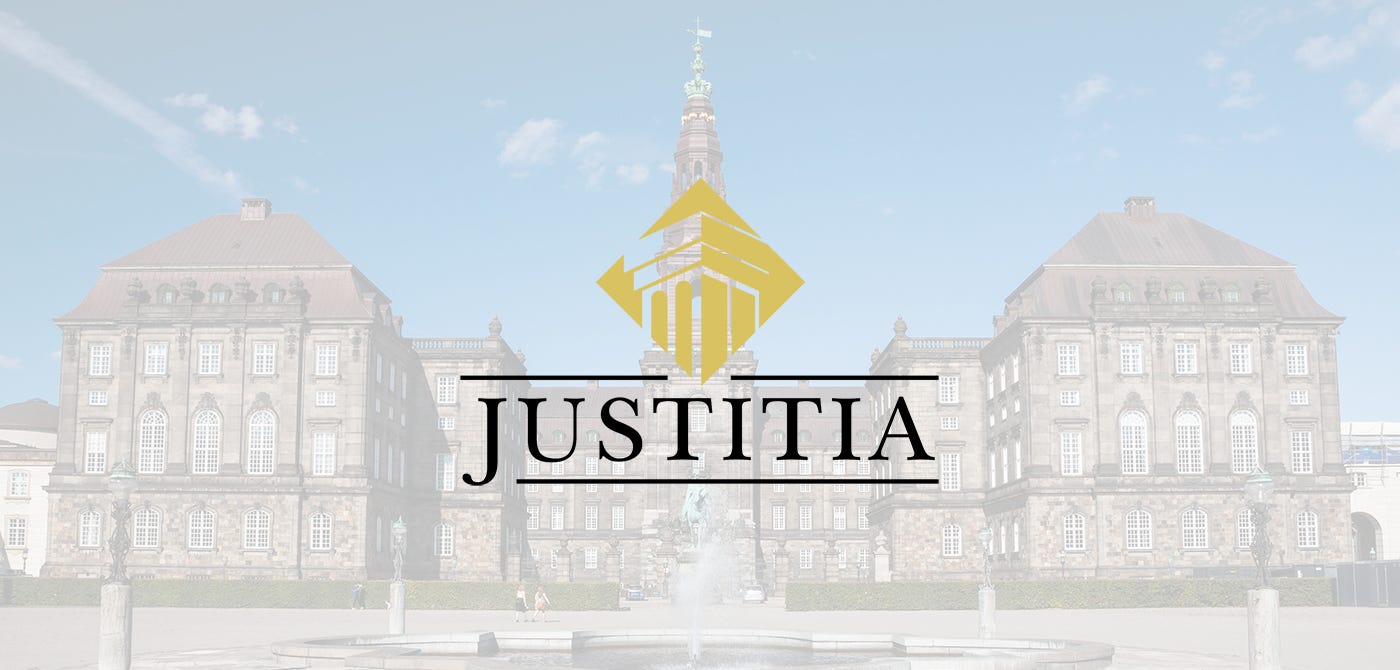Jacob Mchangama on Free Speech
An IBB interview on the triumphs and troubles of free speech in the Middle East.
Jacob Mchangama is a Danish lawyer, writer, and the founder of Justitia, a think tank that promotes and defends individual freedom, the rule of law, and human rights worldwide. Our translators just finished translating his book Free Speech: A History from Socrates to Social Media into Arabic and are now hard at work disseminating the book across the Middle East. The book outlines the history of free speech as a concept, and how this fundamental right is our “first freedom", from which all other freedoms follow. Mchangama also details the rising threats to free speech, and how power is used to silence others, something our readers across the MENA region know all too much about.
Why did you write this book?
I was born and raised in Denmark – a free and secular country and for most of my life I have taken free speech for granted. But in 2005 a Danish newspaper published cartoons of the Prophet Muhammad that caused global uproar and violence. This led me to investigate the importance of free speech which has been an obsession ever since. Especially since I saw how perspectives often change. When the cartoons were published many on the left suddenly claimed that insulting Muslims was an abuse of free speech. But when a Danish right-wing government banned Islamic preachers with “undemocratic values,” people on the right suddenly had nothing to say about free speech.
What responses has Free Speech gotten from its readers outside of the West? What about reactions from inside the West?
I´ve been lucky to get a lot of very positive reviews and press coverage in the West. But I think its crucial to highlight that free speech is not a uniquely Western value and I´ve been lucky to see interest in the book from Latin America, India and Africa, moreover, the book will be translated into Japanese, and of course Arabic, something which I´m very proud of.
What effect do you hope this translation will have on its readers? The region as a whole?
I very much hope that readers of the Arabic translation will appreciate the crucial role that Arabic-speaking Islamic scholars made to the progress and dissemination of science and scholarly debate. I also hope they´ll take inspiration from the fact that ext earliest medieval freethinkers were to be found in the Islamic world. I´m thinking about people like al-Rāzī who believed that “reason was “the ultimate authority, which should govern and not be governed; should control and not be controlled, should lead and not be led”, and who was highly critical of the restrictions religious fanaticism placed on free thought. But also Ibn al-Rāwandī who used the fertile intellectual climate of the ʿAbbāsid Caliphate to question prophecy and holy books. Unfortunately, there is still a dire need of freethinkers who dare challenge religious and political orthodoxy in the MENA region where too many states punish “blasphemy” and shut down essential debates and new ideas.
Would you consider yourself a free speech absolutist?
No. I don’t think any serious person would be in favor of free speech absolutism when you think it through. I believe that people should be free to criticize Islam, but I don’t think free speech should protect incitement to violence against Muslims.
Can speech be violent outside of direct threats? Isn't it just words?
Speech can certainly lead to harm. But very often it is difficult to establish a direct link between speech and specific acts. Also, the danger of allowing governments to punish theoretical and potential harms of speech is that this will be used to crack down on dissent. You see this in places like Egypt and Saudi Arabia, where “terrorism” and “national security” has been interpreted very widely to be able to punish journalists, human rights activists and critics of the governments. This is why I believe that restrictions on free speech should
Are you optimistic that emerging new tech, such as crypto and AI, might help promote free speech in authoritarian countries?
I think technology can and does help people in countries where official censorship and propaganda hinders pluralism and access to information. The Arab Spring was an example of how technology could mobilize people to challenge and oust long-term authoritarian rulers. The challenge is that often it is a very small group of tech-savvy activists who are able to circumvent censorship. Moreover, many states – including Egypt, Saudi Arabia, and the United Arab Emirates – have learned their lesson from the Uprisings and with help from China have reverse-engineered the technology that was supposed to liberate people and turned it into a dystopian nightmare of censorship and surveillance.
What has been the greatest triumph of free speech in the 21st century? Its greatest defeat?
The greatest triumph is probably that billions of people around the world have gained access to the Internet, and so even with sophisticated censorship more people have access to more information and opinion than ever before in human history. The greatest defeat or threat is that democracies in the West have lost faith in free speech which has helped fan the flames of authoritarian censorship.
The Taliban is on Twitter. Should they be allowed to stay there?
I guess it depends on what exactly they post. But in general, I think we´re better off knowing what kind of messages and information the Taliban wants to spread, than closing ourselves off from an already closed country. We have a better chance of countering the Taliban if we actually know what they think and say than otherwise. But we should not allow the Taliban to incite violence or threaten their opponents online.
Can propaganda ever be used for good?
Well, how do you define propaganda? I´m very much in favor of attempts to reach ordinary Russians, Saudis, and Iranians with news and information critical of their rulers and that may challenge the ideas that they´re fed by official channels. But I´m sure the regimes and their supporters in these countries would label it propaganda.
What prerequisites does a country need, if any, to have a society that values free speech?
I think you first and foremost need a culture of free speech. One where the tolerance of social dissent is seen as a strength and even a virtue, rather than a threat, and where people recognize that free speech is the antithesis of violence and the necessary precondition for social peace among people with very different ideas about politics, religion and philosophy.
Why do you think free speech emerged as a western value, rather than any other region or culture, and why do you think it has been so challenging to export outside of the West?
Well as I show in my book free speech has not been a uniquely Western Value and the Islamic world has contributed to the development of scholarly debate and pushing the boundaries of free inquiry. But it is true that free speech has been developed the furthest in the West. I think there are many complex reasons for this, and I don’t have a comprehensive answer, but these are factors that may have contributed: When you look at values people in the West tend to be much more attached to individualism, secularism and self-expression and to be skeptical of hierarchical authority than people in other parts of the world, not least in the MENA-region. It might also play an important role that the printing press helped spread ideas widely in Western Europe, whereas the Ottoman Empire severely restricted printing and did not permit printing in Arabic until the 18th century and banned the printing of Islamic texts until the early 19th century.
Do you think there are western countries with blasphemy laws that are just as strict as middle eastern countries?
Fortunately, there has been a development where a lot of European countries – incl. Denmark, Norway, Iceland, Netherlands and Ireland, have abolished blasphemy bans. But even in countries like Finland where religious insult is sometimes prosecuted the punishment is very mild, compared to, say, Saudi Arabia, where Raif Badawi was sentenced to ten years in prison and a thousand public lashes for insulting Islam on his blog, or Egypt where you see waves of prosecutions for blasphemy.
Thank you Jacob for taking the time to speak with us and our Middle Eastern audience on the complexities and challenges that come with preserving our first freedom. The Arabic version of this interview will be published in the April issue of our MENA magazine.







His book is great. I particularly enjoyed the connections he made to the present day censorship in the west. Blasphemy laws have woke analogs in the west that can get one cancelled.